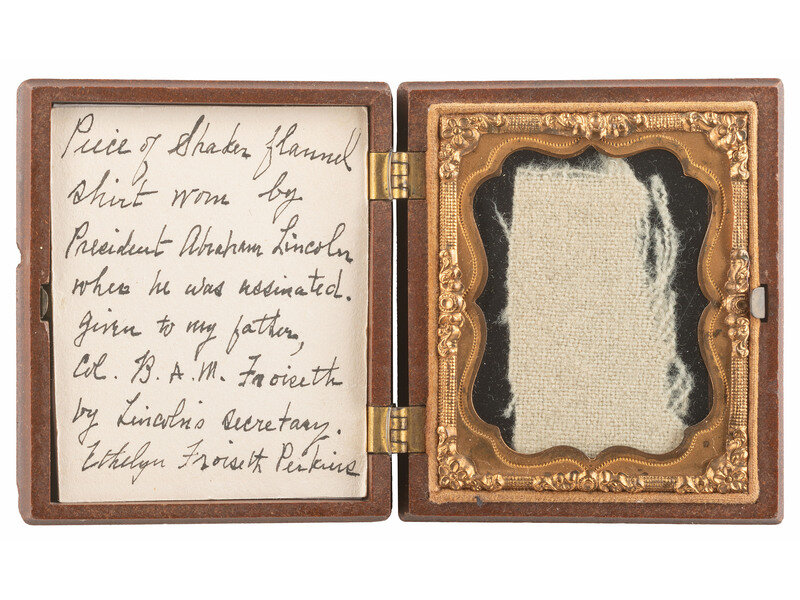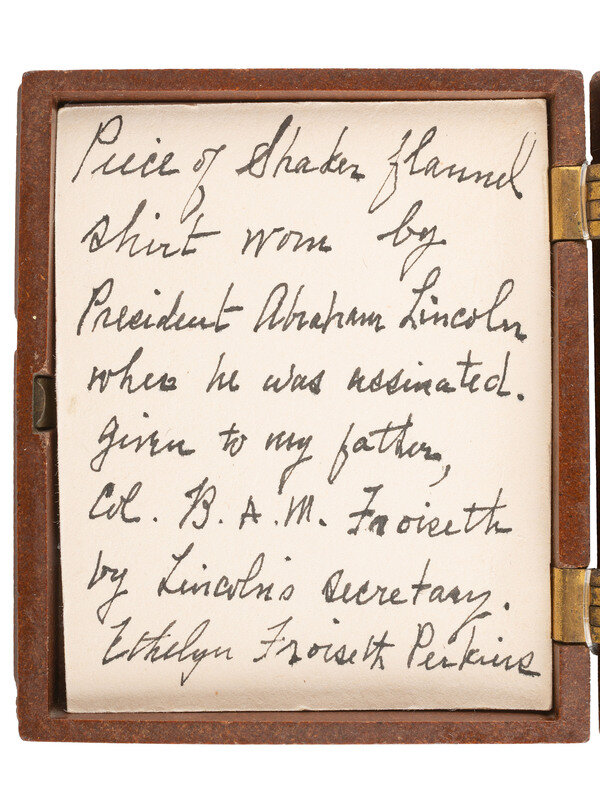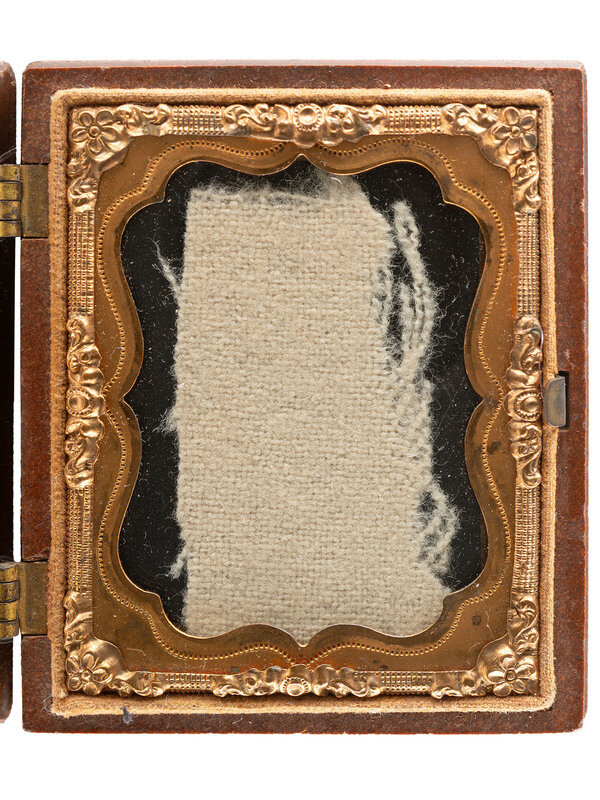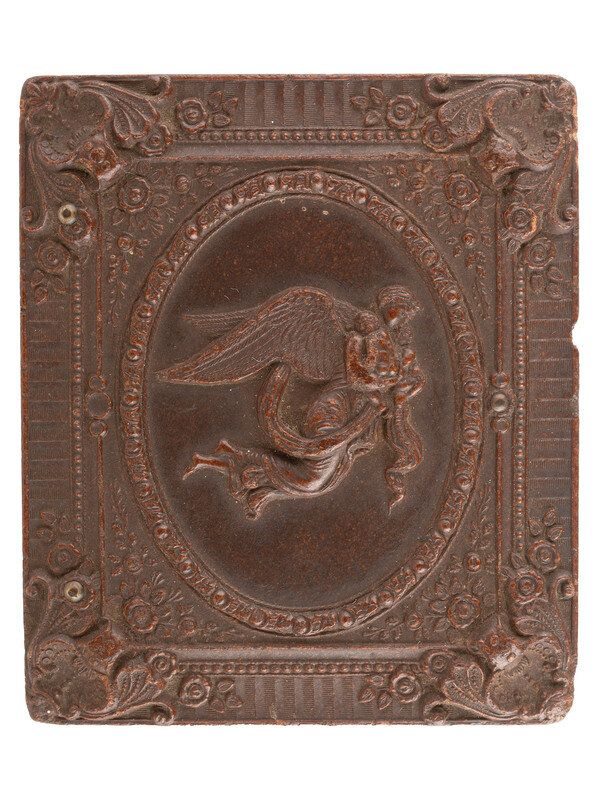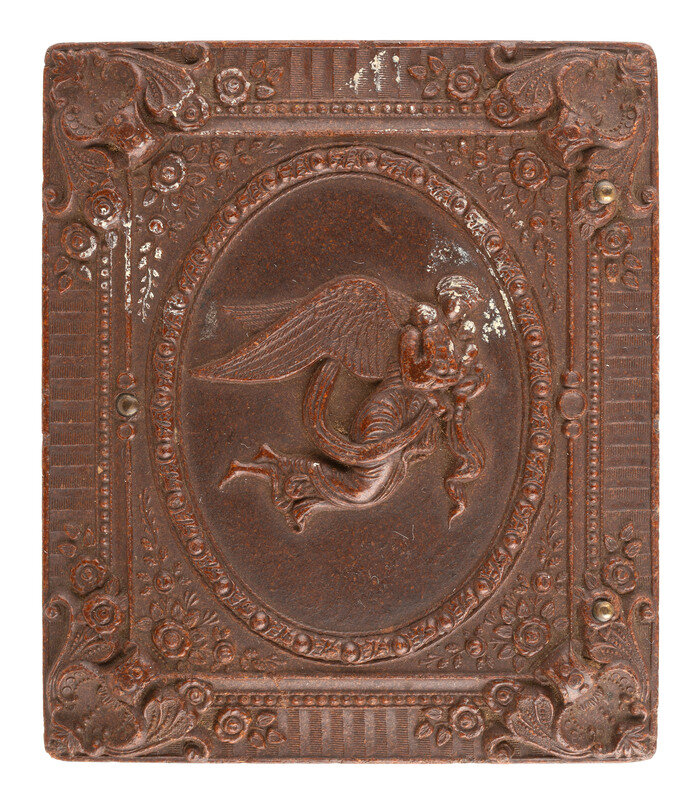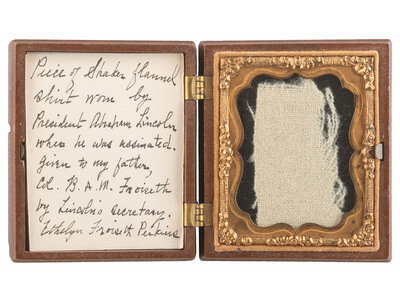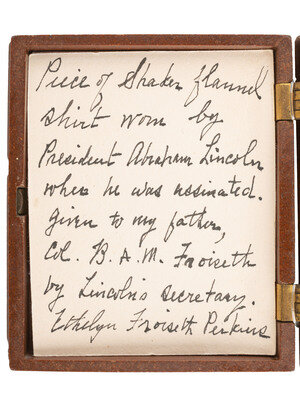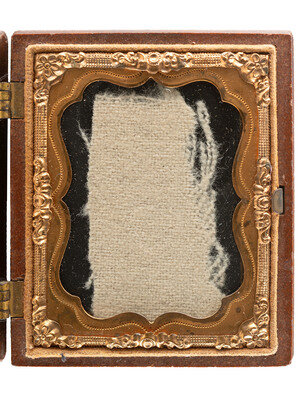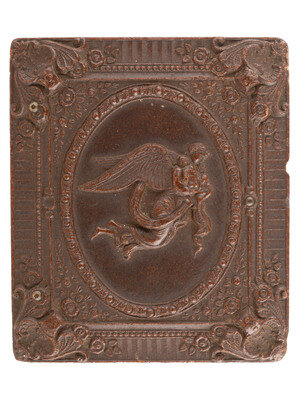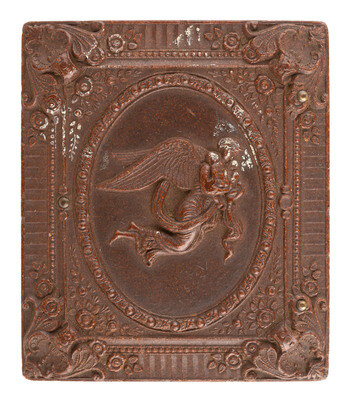Condition Report
Contact Information
Auction Specialist
Lot 166
Sale 6425 - American Historical Ephemera and Early Photography, including The Larry Ness Collection of Native American Photography
Part I - Lots 1-222
Oct 23, 2025
10:00AM ET
Part II - Lots 223-376
Oct 24, 2025
10:00AM ET
Live / Cincinnati
Own a similar item?
Estimate
$12,000 -
18,000
Lot Description
[CIVIL WAR] -- [LINCOLN, Abraham (1809-1865)]. Shirt fragment identified as "worn by President Lincoln when he was assassinated."
Fabric remnant, approx. 2 x 1 1/4 in. (sight), housed under glass in ninth plate Union case (fabric unexamined outside case, unable to determine definitively if fabric is wool or cotton, case with wear and some surface residue but overall good condition). Autograph note signed adhered to case opposite fragment reads, "Piece of Shaker flannel / shirt worn by / President Abraham Lincoln / when he was assinated [sic]. / Given to my father, / Col. B.A.M. Froiseth / by Lincoln's secretary. / Ethelyn Froiseth Perkins."
Col. Bernard Arnold Martin Froiseth (1839-1922) is best known today as Utah's first cartographer, but during the Civil War he was intermingling in D.C. Republican circles and actively supporting the Union war effort. A Norwegian immigrant, Froiseth emigrated to Minnesota with his parents as a child. His obituary in the Salt Lake Tribune (5 November 1922) indicates that he earned a civil engineering degree from the University of Montreal and served in the Department of the Interior prior to being commissioned a colonel in the army and detailed for special duty in Washington, D.C. during the Civil War. Froiseth had also been active in support of the Union before his move to D.C., acting as an Authorized Recruiting Officer for the Second Battery of Artillery Minnesota Volunteers. His "special duty" in D.C. is not specified in the obituary, but the Washington, D.C. City Directory for 1863 identifies Froiseth as a "Clerk" residing in Washington, D.C., and the U.S., Register of Civil, Military, and Naval Service, for 1863 identifies Froiseth as a clerk in the War Department's Paymaster General's Office. By the end of the war he seems to have taken a new position, as a newspaper advertisement from the 8 December 1865 Washington, D.C. Evening Star identifies him as part of the Quartermaster General's Office.
It is unclear which of Lincoln's secretaries might have given Froiseth this fabric fragment, though it is widely established that fragments of Abraham Lincoln's clothing were distributed after his death. General Daniel Rucker cut six pieces from Lincoln's undershirt, given to the soldiers who transported his body from the theater to the White House. Other fragments, including bloody pieces of his shirt, were also collected and distributed by people at the scene and in the days following his assassination. Froiseth was possibly known to Lincoln and his secretaries, as in 1864 he had written to President Lincoln concerning immigration. (See Library of Congress, Abraham Lincoln Papers: Series 1. General Correspondence. 1833-1916: B.A. Froiseth to Abraham Lincoln, Friday, May 06, 1864.) In addition to having addressed a letter to Lincoln, Froiseth letters can be found in the papers of Stephen A. Douglas (See University of Chicago Library, Stephen A. Douglas Papers 1764-1908.) Froiseth's own political activism related to foreign immigration might also have generated connections to Douglas and/or other high-ranking Republicans. His positions in the War Department and Quartermaster General's Office might also have placed him in proximity to Lincoln associates.
Following the Civil War, Froiseth removed to Utah as an attaché of the surveyor general's office. He created the first map of the territory of Utah in 1870, and later entered the business world with interest in real estate and mining. In 1871 he married Jane "Jennie" Anderson (1843-1930), founder of "Blue Tea," Utah's first women's club and a prominent anti-polygamy advocate. Ethelyn R. Froiseth (1876-1977) was the daughter of B.A.M. Froiseth and Jennie Froiseth. Ethelyn married Percival Osborne Perkins in Salt Lake City in 1900. Like her parents, Ethelyn Perkins was active in civic and political life, with the 1928 edition of "Women of the West" citing her as "active in all civic and musical affairs of the community [of Salt Lake City]" including the Ladies Literary Club, the Civic Opera Association, and Order of the Eastern Star, a fraternal organization.
